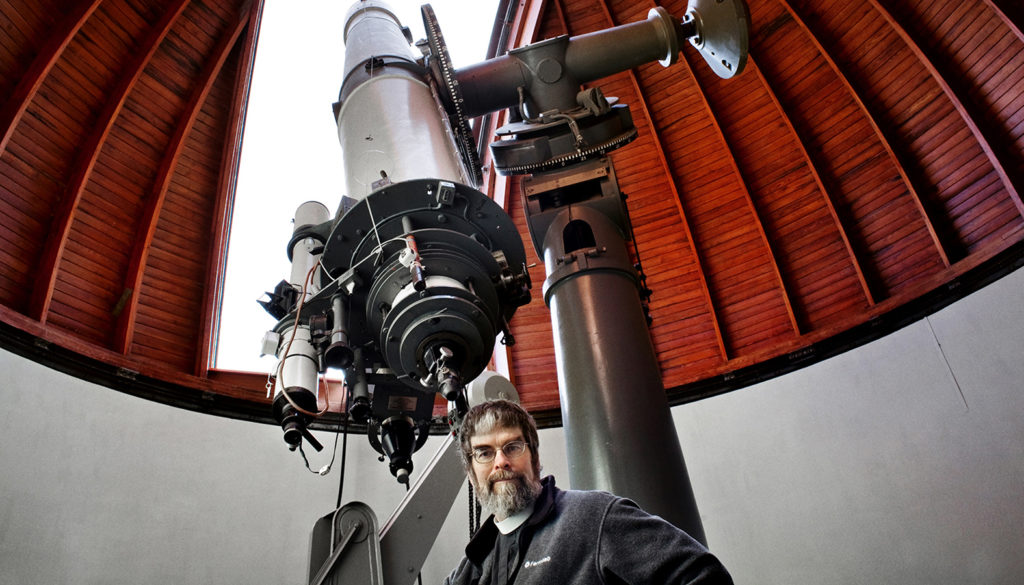Brother Guy Consolmagno, SJ, is the director of the Vatican Observatory, president of the Vatican Observatory Foundation, astronomer, and author of numerous books and scientific research papers.
In short, Brother Guy is the “Pope’s Astronomer.”
His lifelong love of astronomy began as a boy when his imagination was captured by the Americans landing on the moon. His lifelong love of God began in a household of loving parents, two years working with the Peace Corps in Africa and then joining the Society of Jesus, where scientist Guy became Brother Guy.
When I had the chance to speak with Brother Guy before he gave a lecture at the Los Angeles Central Library, I thought of my high school English teacher, a man who was so passionate about Shakespeare he was able to pass on that passion to cement heads like me. Brother Guy had a similar fire for his dual passions of astronomy and his deep Catholic faith. In a sense, it is a match made in heaven.
His lecture, which was the inaugural Amelia Earhart Lecture Series in Adventure and Exploration, was not something one would expect to find in a secular place like a public library. But it is a venue Brother Guy seems comfortable navigating. He told me he hoped people would leave his lecture with a new appreciation of how faith is bolstered by science and how, contrary to popular myths, the Church is not anti-science.
As he put it, “I want people to think, wow, here is a guy wearing a Roman collar and a ring from MIT.”
For too long there has been a decided effort to enforce a separation of church and science, which has not helped either side. All faith and no reason and you have to suggest dinosaur eggs on Noah’s Ark. All reason and no faith and you have to believe the intricacies of not only the entire universe but the development of life on Earth is the result of merely unrelated accidents.
Popular culture continues to elevate science to the level of idolatry with terminology like “settled” science, or absolutist claims about various scientific theories.
Brother Guy’s lecture was a thoughtful rebuttal to the notion that religious belief and scientific inquiry were incompatible. He makes the case for just the opposite: that the two are actually essential for a more complete understanding of both the natural and the supernatural.
And why shouldn’t it? If God created the heavens, we are under an obligation to investigate and attempt to understand how they operate. Granted, the Church was not always quick to embrace scientific study that wasn’t explicitly Christian in nature. Even a Church Father as robust as St. Thomas Aquinas had to do a lot of lobbying on behalf of scientific giants from the ancient world like Aristotle, Pythagoras, and Archimedes.
The Church hit her stride by the 16th century with the astronomy-based Gregorian calendar and serious study of the cosmos by Catholic giants like Copernicus and multiple Jesuit priest scientists whose works are studied to this day. It was Catholic priest Father Georges Lemaître (not a Jesuit) who was the first scientist to develop the Big Bang Theory.
Just as there is a balance to the universe, Brother Guy urged an evenness between religion and science. He believes when they are out of balance, it is not good for the mind or the soul. He warned of the growing phenomena of “scientism” and the view that science is somehow as irrefutable as Scripture.
In one of his books available at the Vatican Observatory, he quotes one of his former bosses who also understood the need for equilibrium. “Science can purify religion from error and superstition; religion can purify science from idolatry and false absolutism.” (St. Pope John Paul II).
Because science has to rely on human beings, it is always going to be prone to mistakes and even folly. To Brother Guy, that is the adventure part of science. He sees science as being about seeking the truth through a sometimes messy and disjointed process. Scripture is about presenting the truth even if it’s sometimes presented in a literary fashion as in the Book of Genesis. To Brother Guy, Genesis is no more a book about science than Shakespeare’s “Macbeth” — with its three witches making their brew — is a cookbook.
Brother Guy sees the universe as the second-greatest story ever told, and compares what scientists do to what the inspired authors of the Bible did: convey through storytelling those truths about God and his creation. Looking at science and religion this way makes them inseparable.
Brother Guy has worked for three popes and has been inspired by them all. He realizes he stands not only on the shoulders of all the great Jesuit and non-Jesuit priest/scientists who came before him, but a lot of popes who championed scientific inquiry.
Brother Guy left those in attendance with plenty to think about, but nothing as profound as his thesis that if, as Scripture declares, “The heavens proclaim the greatness of God” (Psalm 8), then the study of the universe is a form of worship.

